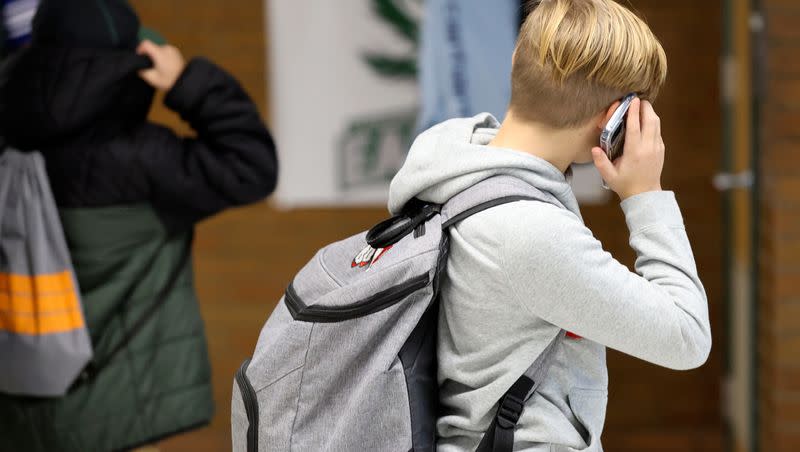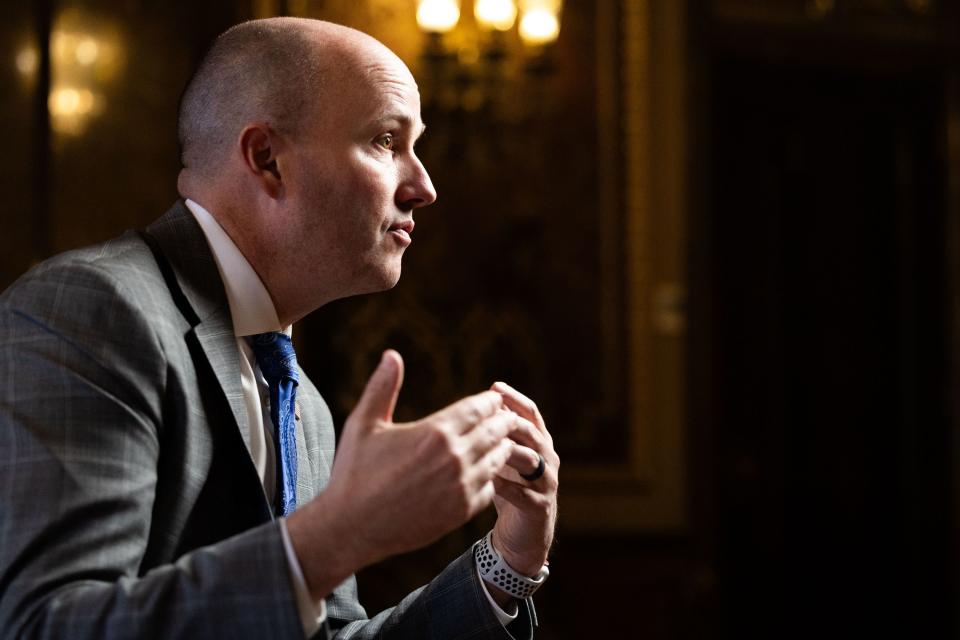Opinion: The governor makes his case for getting cellphones out of the classroom

Last summer, I turned off my phone and hiked into the woods. In an isolated cabin, I spent the better part of three days unplugged and uninterrupted, giving me time to read and write, reflect and pray. It was incredible.
Technology is a beautiful thing, and I appreciate how smartphones can connect us with our families, our friends and the world at large. But I also recognize these devices have a unique power to distract us, divide us and affect our mental health.
Our children are especially vulnerable to the negative effects of cellphones. That’s why I sent letters to our State Board of Education, district and charter school leaders, school principals and school community councils, urging them to restrict cellphones during class time.
Mounds of evidence show how cellphones interfere with our ability to learn. Jonathan Haidt, the renowned social scientist, has written extensively about how cellphones affect our well-being and ability to focus. He cites one study where a group of students about to take a test were divided into three groups: some were asked to put their phones on the desk, others to put their phone in a pocket or bag, and the rest were to leave their phones outside the room. Those students who were physically closer to their phones performed worse on memory tests than those further away.
Another study showed that college “students studied less than 6 minutes before switching to (a) technological distractor.” Yet another found that “students who were not using their mobile phones wrote down 62% more information in their notes, took more detailed notes, were able to recall more detailed information from the lecture, and scored a full letter grade and a half higher on a multiple choice test than those students who were actively using their mobile phones.”
The evidence is overwhelming: Removing cellphones during study time improves student performance.
Related
Cox seeks to crack down on cellphone use in Utah public schools
Gov. Cox to public schools: Students should shelve cellphones while at school
Some Utah schools are already doing this with very positive results. Delta High School in Millard School District is one of them. Delta High students put their phones in a clear pocket that hangs in front of the classroom. “It was a battle to begin with, but it has been so worth it,” said Assistant Principal Jared Christensen. “Students and parents have all adapted, our teachers are happier and learning has increased.”
At Evergreen Junior High in Granite School District, students can’t use phones in classrooms, halls or lunchrooms. “It’s so much easier to just ban them altogether,” said Principal Ryan Shaw. “Learning has improved, and our scores reflect that. Bullying and fighting have decreased. The students connect with each other in a more meaningful way.”
When students are on their phones in the halls and at lunch, their ability to make friends and connect with others diminishes. We need each other and school connections are great mental health protective factors.

To be clear, I’m not advocating for a complete ban of cellphones in schools. Nor do I believe in one-size-fits-all solutions. But I am pushing schools and districts to work with parents to develop cellphone policies that will give every student the best environments to focus and to learn. And I hope parents will advocate for phone-free instruction.
Placing cellphones in backpacks or lockers during class time allows students to give their undivided attention to lessons, to fully participate in discussions and to build relationships with their peers. Phone-free classrooms empower teachers to engage fully with their students.
Our students deserve every advantage and removing cellphones from learning time is one proven way we can help our children succeed.
Gov. Spencer Cox is Utah’s 18th governor.

